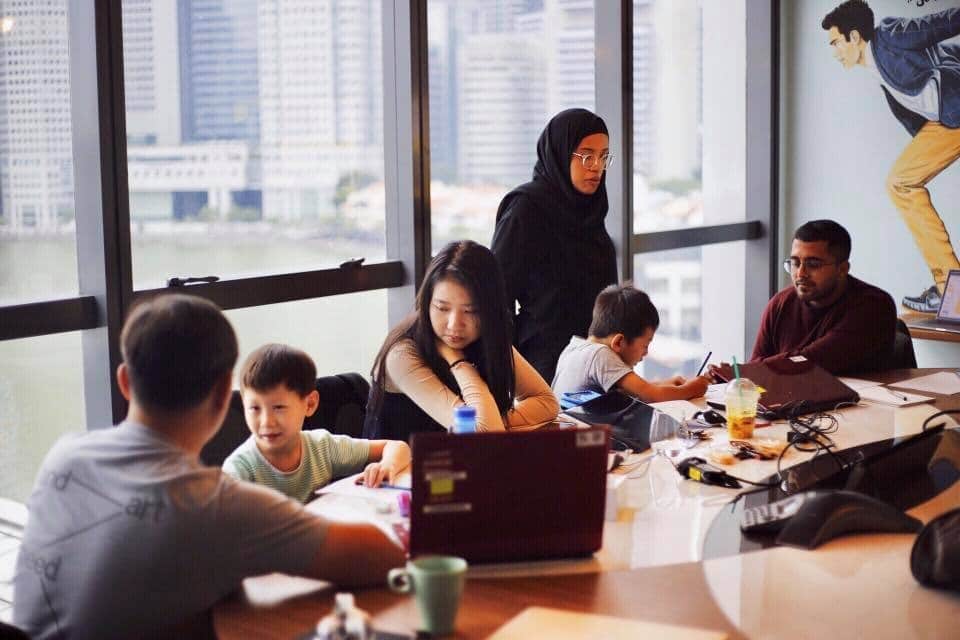Girls in Tech: Why it Matters
March 7, 2019

As an organisation at the intersection of education and tech, we’ve got a responsibility to lay the foundations for a better world. A large part of this is providing more girls access to digital literacy and opportunities in tech. Our team is >50% female, and while this diversity makes us stronger, we know that demographics like this aren’t common, especially in the tech space.
Here’s a guest post from Rocket Launcher and Mom Huda about why having girls in tech matters, and what we can do to level the playing field.
Girls in Tech: Why it matters
It is clear that companies have been identifying the need for gender diversity in the workplace. However, not much progress has been made in the past few years.
In a recent global study of Women in the Workplace by McKinsey Global Institute – based on four years of data from 462 companies employing more than 19.6 million people – two findings are striking: One, women, particularly women of colour, remain marginalised. Two, companies need to change hiring procedures and support women in entry and managerial positions to produce significant progress.
Diversity in the workplace matters.
Diversity is necessary for any group or organisation to survive and thrive in the ever-evolving world. A group with diverse backgrounds and perspectives will make more sound decisions compared to a homogeneous group. Research has shown that diverse teams are more innovative, and internalise facts in a more tactful way.
As Emily Chang points out in her book ‘Brotopia: Breaking Up the Boys’ Club of Silicon Valley’, this matters especially in tech because of the extent to which developments in the industry – which are designed and executed by a small group of mostly privileged males – disproportionately and disruptively impact how people live, work, and play around the world.
So, what can we do to to encourage more women to get into tech?
Firstly, as a parent to a 4 year-old boy, I feel that there is a need to stop associating hobbies, toys, professions, and gender.

Huda and her son at an art exhibition.
Most boys are interested in programming/coding simply because they enjoy playing games. In other words, the love of games forms one of the major contributing factors to encouraging a child to want to code. However, playing games is often stereotyped as a male-oriented activity, and there are parents who prefer their female children not to be participate in such activities for no reason other than it being characterised as a masculine activity. Gaming and other activities shouldn’t be gendered – we don’t know what doors they will open or close for our kids.
Secondly, we need to provide a safe space to encourage girls to pick up programming skills.

Aanya learning to programme at Saturday Kids.
In most of my classes, the ratio of girls to boys is fairly low, at around 1:4. This sometimes causes distress to girls. “Bro culture” (yes, even among kids) can intimidate girls who feel left out, unable to relate or excluded from discussions. Perhaps running an all-girls bootcamp or competitions like Technovation might encourage more girls to pick up coding without feeling alone.
Why I became a tech educator…
Growing up, I’ve always done things against the grain. Picking up DJ-ing, skateboarding, all whilst being a girl with a hijab.

Huda on the decks.
When I used to teach New Media (a subject that includes coding) in schools as a co-curricular activity, I noticed that the number of girls in the classroom was close to zero.
It was always those one or two “gamer girls” who were interested in programming their own games. This made me to want to teach tech.
While I can’t change the number of girls joining coding classes, I hope that having a female teacher in the class changes classroom culture and encourages that one girl.
Sometimes, all it takes is an ally.

Part of the Saturday Kids Product team at work.
As someone who picked up coding on her own, I know that the journey can be terribly lonely. I picked up programming briefly in Art School so I could create computational graphics, and decided to pick it up again one night while wondering about my purpose in life as a new mum.
This was why in addition to teaching at Saturday Kids, I volunteer at The Codette Project, a non-profit organisation focused on helping and guiding minority women – in particular, Muslim women – in Singapore to succeed in tech.

The Codette Project – Huda’s right at the back!
Last July, The Codette Project organised Singapore’s first women-only hackathon, inviting women of all ethnicities who might not necessarily come from a technical background to use their knowledge to solve problems related to the Sustainable Development Goals.
For women without prior tech knowledge, the hackathon allowed them to understand how they could play a part in using tech for good. For those with tech knowledge, they were able to use their skills to solve problems. As part of the event, I also conducted a quick crash course on creating a mobile app without using text based programming languages.

A snap from Project Empower, a collaboration between Saturday Kids and 21C Girls.
To my fellow educators and parents, this is what we can do to encourage more girls to go into tech:
- Teach girls a growth mindset. Let them know that their skills can be developed as opposed to being static and unchangeable. Negative stereotypes rely on the assumption that girls lack the innate ability needed for success. Emphasising how skills change and develop over time challenges this belief.
- It’s okay to fail. This relates to having a growth mindset. Failure is perpetually under-valued. In our efforts to protect children, we take valuable learning moments away from them. Failure provides opportunities that cannot be gained any other way. Failure is a blessing in disguise. Failure is not being unsuccessful; the experience of failure can be a guide to success.
- Evoke curiosity wherever you go. Encourage girls to be fearless and confident. Pursuing a skill that might be out of the norm for now can be intimidating, but let’s raise girls who can look past their fears of entering a male-dominated space.I had no formal background in Computer Science. However, growing up going to music shows during my school years has always left me wondering how audio visual projections were created.I took part in an elective conducted by an interactive art lecturer who did computer-generated art and got him to give me a crash course. I was fascinated by how data eg. sounds, sensors could be translated into moving images called computational graphics.Since computer-generated art was still very niche back then, it wasn’t easy to find a course online, and I eventually decided to pick up some programming languages to kickstart my newfound interest.Curiosity led me to self-study both what I was familiar with – art and design – with a new spin, using logic and algorithms.
- Provide more role models. The lack of visible female role models is a problem, especially for young girls who might only see boys playing games or in IT-related CCAs. One way to overcome this is to showcase examples of actual women in tech who might just inspire young girls by providing them real-world examples to model themselves after.
- Create more programmes just for girls. Competitions like Technovation, which encourage young girls to get together to innovate new apps with guidance from mentors, is an incredible outlet for young girls to be inspired by and provide inspiration to other girls as well!
To the young girls:
Boys or girls, we can do it all. Coding is like having a superpower. After learning to code, life is no longer the same. You’ll always be curious about how things work and how you might use engineering to make something happen.
To adult girls:
Find a strong support system! There’s The Codette Project, Girls in Tech, Techladies, Codinggirls.sg and many more. These organisations provide crash courses/bootcamps and even 30-day coding challenges to encourage more girls to “just whack” and do it. Having a mentor will also help you to focus your goals and your journey towards it.
❤
…
Are you an educator or parent passionate about getting more girls in tech? We’d love to hear from you in the comments!
Want to learn more? Check out these organisations below dedicated to supporting girls and women in tech, and a couple of reads we’ve found helpful for learning more about the issues involved.
Resources:
The Codette Project
Girls in Tech
Techladies
Codinggirls.sg
Recommended reading:
Women in the Workplace, 2018 | McKinsey & Company
Brotopia: Breaking Up the Boys’ Club of Silicon Valley by Emily Chang
At Saturday Kids, we’re on a mission to inspire kids to be curious and self-motivated learners.
Find out what we’ve got planned for kids this school holiday right here!